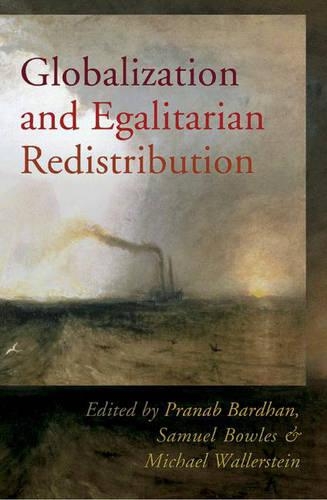
Globalization and Egalitarian Redistribution
(Hardback)
Publishing Details
Globalization and Egalitarian Redistribution
By (Author) Pranab Bardhan
Edited by Samuel Bowles
Edited by Michael Wallerstein
Princeton University Press
Princeton University Press
10th April 2006
United States
Classifications
Professional and Scholarly
Non Fiction
Globalization
361.6
Physical Properties
Hardback
352
Width 152mm, Height 235mm
624g
Description
Can the welfare state survive in an economically integrated world Many have argued that globalization has undermined national policies to raise the living standards and enhance the economic opportunities of the poor. This book, by sixteen of the world's leading authorities in international economics and the welfare state, suggests a surprisingly different set of consequences: Globalization does not preclude social insurance and egalitarian redistribution--but it does change the mix of policies that can accomplish these ends. Globalization and Egalitarian Redistribution demonstrates that the free flow of goods, capital, and labor has increased the inequality or volatility of labor earnings in advanced industrial societies--while constraining governments' ability to tax the winners from globalization to compensate workers for their loss. This flow has meanwhile created opportunities for enhancing the welfare of the less well off in poor and middle-income countries. Comprising eleven essays framed by the editors' introduction and conclusion, this book represents the first systematic look at how globalization affects policies aimed at reducing inequalities. The contributors are Keith Banting, Pranab Bardhan, Carles Boix, Samuel Bowles, Minsik Choi, Richard Johnston, Covadonga Meseguer Yebra, Karl Ove Moene, Layna Mosley, Claus Offe, Ugo Pagano, Adam Przeworski, Kenneth Scheve, Matthew J. Slaughter, Stuart Soroka, and Michael Wallerstein.
Reviews
"The book is impressive in its scope, in particular for the wealth of empirical data provided... [I]n terms of stimulating thought and debate about globalization and redistribution its contribution is significant."--Michael Orton, Economic Issues "For those seeking a nuanced and penetrating set of analyses on the possibilities for egalitarianism under globalization, this volume is an excellent source to become well-informed about the limits placed by globalization as well as the 'non-limits'. In providing some unconventional and hopefully encouraging answers, without overstating their case, this book further affords a valuable resource to scholars and policy makers alike."--Arjun Jayadev, International Review of Economics & Finance
Author Bio
Pranab Bardhan is Professor of Economics at the University of California, Berkeley. Samuel Bowles is Research Professor and Director of the Behavioral Sciences Program at the Santa Fe Institute, and Professor of Economics at the University of Siena. Michael Wallerstein is Professor of Political Science at Yale University.
